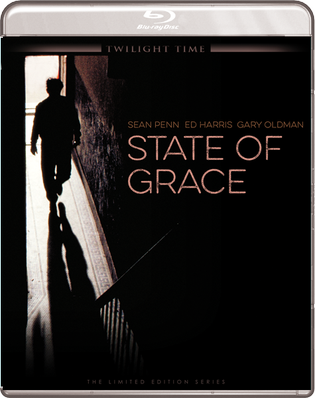
Written by Kristen Lopez
Unlike some niche Blu-ray distributors, Twilight Time doesn’t just release classic films. Oftentimes their release output includes underrated or little seen gems that wouldn’t immediately warrant an HD disc. In the case of their latest, the 1990 crime thriller State of Grace, rewatching this on Blu was a great way to re-familiarize myself with a film that I’d forgotten I enjoyed.
After a decade-long absence, Terry Noonan (Sean Penn) returns to his hometown of Hell’s Kitchen, immediately getting back into the good graces of small-time hood Jackie Flannery (Gary Oldman). As Terry becomes more comfortable with his old friend, he works his way up to impressing the boss, Jackie’s brother Frankie (Ed Harris). But Terry holds a secret that could end up threatening his life and the lives of his friends and love interest (Robin Wright).
Despite the A-list talent on display, State of Grace sailed under the radar upon release in 1990, probably due to another little known gangster film released just a week or so later…Martin Scorsese’s Goodfellas. Nowhere near the level of Scorsese’s opus, State of Grace wasn’t really trying to do much more than be a good neo-noir, a throwback to the 1930s gangster films starring the likes of James Cagney. As explained by historian Julie Kirgo in the essay accompanying Twilight Time’s Blu-ray, much like Cagney’s movies, State of Grace sees a young man return to a hometown greatly changed, falling back into bad habits while desperate to escape “the life.”
Much of Hell’s Kitchen has fallen prey to gentrification, obviously at odds with the ethnic diversity in the town. It presents an almost ironic twist that, for all of Terry’s and Kathleen’s (Robin Wright in one of her earliest pairings with her soon-to-be, now ex-, husband Penn) attempts to escape the horrors and violence of their past, the present “classifying” of the city has arrived and they still aren’t happy. There’s a very clearly delineated hierarchy screenwriter Dennis McIntyre’s script explores, and with the arrival of gentrification, the loss of identity and community comes with it. Like most 1930s crime dramas, everyone wants to find a way to “go legitimate” and are failing.
The one questing for the most legitimacy is Ed Harris’ villain, Frankie. Frankie is the closest to the 1930s paradigm, in that he has class and a certain code of conduct. When Jackie screws up, and he does several times, he complains about the group’s “sense of manners.” And yet, killing doesn’t come easy to him. He’s evil, no doubt – he keeps the hands of the people he’s murdered so the crew can reuse their guns without putting fingerprints on them – but he also has a picture perfect family living in the suburbs and grapples with murdering his brother when called to do so. If anything, the worst villains are the Italian crime bosses wanting, and controlling, Frankie. Ed Harris originally refused to do this film, but came around to it and it’s for the best. His steely gaze contrasts with his unassuming nature. He’s a “clean” villain of sorts, wearing a three-piece suit and wielding a gun simultaneously.
Upon release, accolades went towards Gary Oldman, as the colorful screw-up Jackie. Oldman’s natural charisma immerses the audience as much as it seduces Terry. Gregarious and outrageous, Oldman works with a character that could have been typed as a moron with a pistol, but he turns the character more into an adolescent in arrested development, at the mercy of his adoration for his big brother.
Sean Penn acts as the straight man to it all, a man whose mysterious ten-year absence culminates in a predictable twist. If anything, Terry falls into a moral quagmire not unlike the typical Cagney films. For Terry, “these are my pals” and it’s just as understandable why, despite knowing of the Flannery’s crimes, he’s still desperate to be a part of the club. The weakest link is poor Robin Wright, coming off the success of The Princess Bride a few years prior and relegated to the role of “the girl,” no different than someone like Priscilla Lane in The Roaring Twenties.
Along with an isolated soundtrack, director commentary and theatrical trailer, Twilight Time gives us all a reason to go back and revisit State of Grace. It’s not as quotable or entertaining as Goodfellas, eschewing frivolity for stark reality, but it’s an actors showcase worth watching.